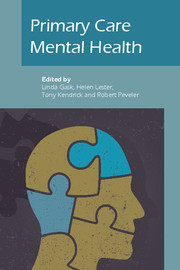Book contents
- Frontmatter
- Contents
- List of figures, tables and boxes
- List of contributors
- Preface
- Part I Conceptual basis and overarching themes
- Part II Clinical issues
- 8 Depression
- 9 Suicide and self-harm
- 10 Anxiety
- 11 Medically unexplained symptoms
- 12 Mental health problems in older people
- 13 Perinatal mental health
- 14 Child and adolescent mental health
- 15 Psychosis
- 16 Emergencies in primary care
- 17 Substance misuse
- 18 Management of alcohol problems
- 19 Eating disorders
- 20 Physical health of people with mental illness
- 21 Ethnic minorities
- 22 Asylum seekers and refugees
- 23 Sexual problems
- Part III Policy and practice
- Part IV Reflective practice
- Epilogue: Racing pigeons and rolling rocks: reflections on complex problems in primary care
- Index
23 - Sexual problems
from Part II - Clinical issues
Published online by Cambridge University Press: 02 January 2018
- Frontmatter
- Contents
- List of figures, tables and boxes
- List of contributors
- Preface
- Part I Conceptual basis and overarching themes
- Part II Clinical issues
- 8 Depression
- 9 Suicide and self-harm
- 10 Anxiety
- 11 Medically unexplained symptoms
- 12 Mental health problems in older people
- 13 Perinatal mental health
- 14 Child and adolescent mental health
- 15 Psychosis
- 16 Emergencies in primary care
- 17 Substance misuse
- 18 Management of alcohol problems
- 19 Eating disorders
- 20 Physical health of people with mental illness
- 21 Ethnic minorities
- 22 Asylum seekers and refugees
- 23 Sexual problems
- Part III Policy and practice
- Part IV Reflective practice
- Epilogue: Racing pigeons and rolling rocks: reflections on complex problems in primary care
- Index
Summary
People consulting their family doctors are more prepared than ever before to ask for help with sexual problems. Furthermore, the English National Strategy for Sexual Health and HIV acknowledged sexual fulfilment and equitable relationships as ‘essential elements of good sexual health’ and called for consistent standards of care to ensure appropriate management of patients with sexual dysfunction (Department of Health, 2002). Liberalisation of sexual attitudes, behaviour and lifestyles since the 1960s and the introduction of new treatments for sexual dysfunction since the 1980s, particularly for men, have made it more acceptable to seek help for sexual difficulties. Nonetheless, although most people with sexual problems regard their general practitioners (GPs) as appropriate sources of help, many remain uncertain whether or not they have a problem or even whether to bring up the subject (Nazareth et al, 2003), and GPs do not always have the skill or time to treat sexual disorders (Humphery & Nazareth, 2001).
Classification
There is considerable debate about how to measure or define sexual difficulties. Part of the problem lies in the definitions of ‘normality’, which have evolved with changes in attitudes and behaviour in society. Whereas behaviours such as masturbation or sexual contact between people of the same gender were once seen as sexual perversions (Davenport-Hines, 1990), they are now regarded as part of the range of normal sexual response. Nevertheless, defining disorder remains subjective and depends on the values, wishes and sexual knowledge of each person and his or her partner. For example, when is ejaculation considered premature? How quick is too quick? Although distress about the problem is often a guide to, or a prerequisite for, the diagnosis of a sexual problem, distress may occur exclusively in the partner. For example, in women with low sexual desire or in men who ejaculate quickly, it may be only the partner who complains and is responsible for the help-seeking that transpires. Furthermore, concepts of usual sexual behaviour in women are changing and there have been claims that the pharmaceutical industry is building a pseudo-science out of female sexual dysfunction (Moynihan, 2003).
- Type
- Chapter
- Information
- Primary Care Mental Health , pp. 335 - 348Publisher: Royal College of PsychiatristsPrint publication year: 2009



